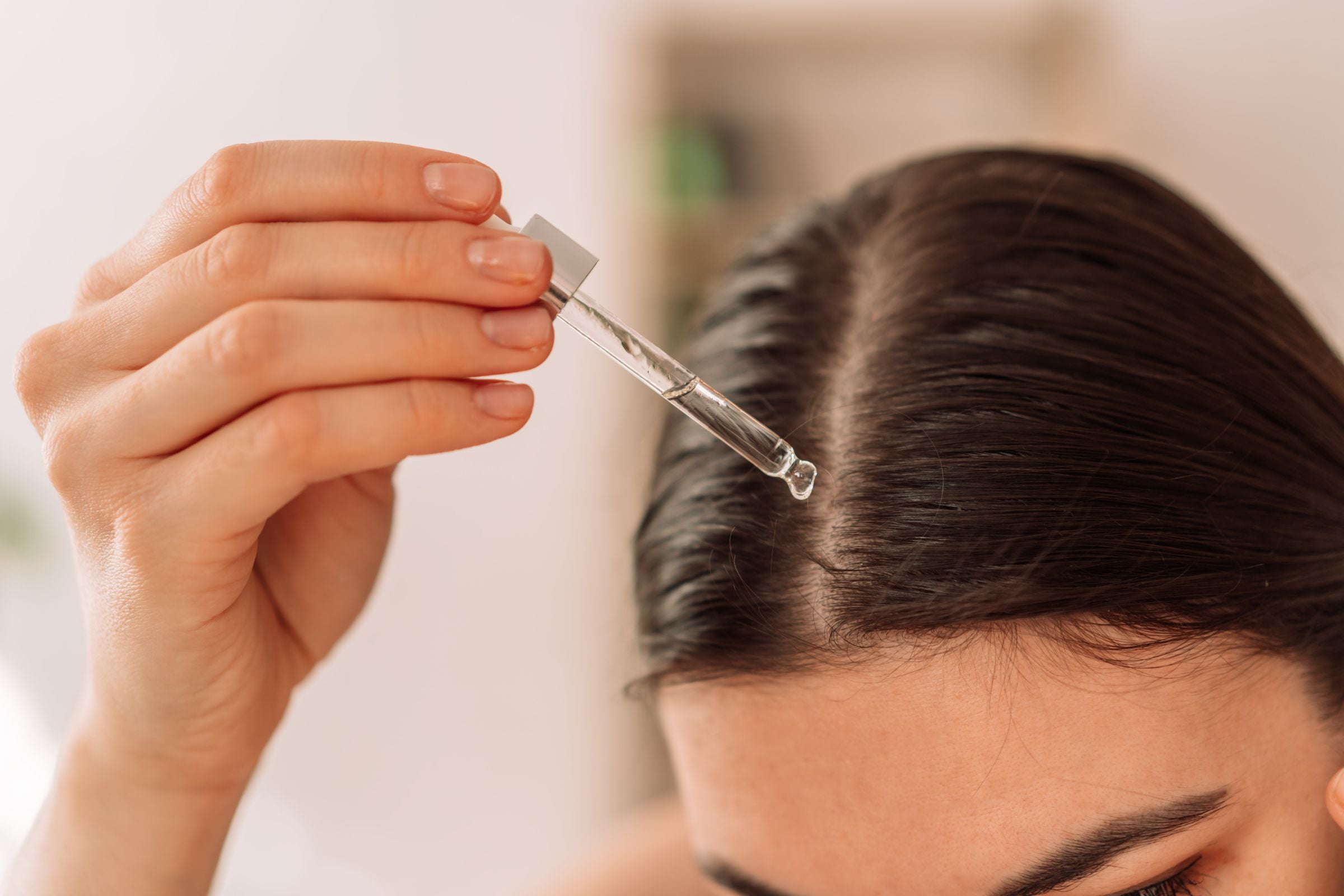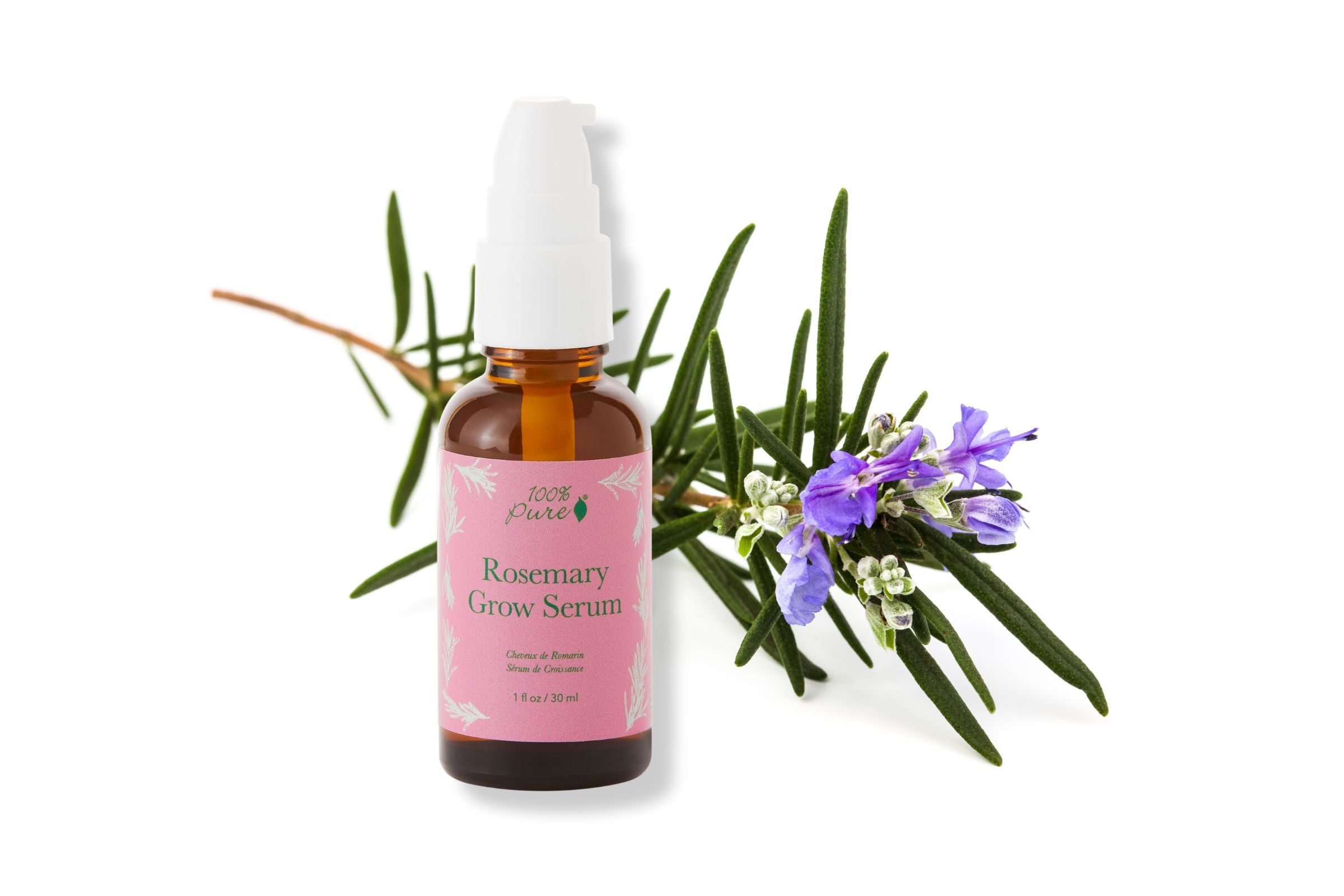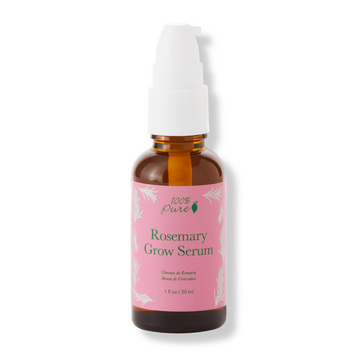From Ancient Rituals to Modern Labs: How Rosemary Oil Revolutionizes Hair Wellness
Written by: 100% PURE®
Rosemary's full name, Rosmarinus officinalis, is derived from the Latin words "ros" (dew) and "marinus" (of the sea). Legend has it that rosemary's name is rooted in a captivating belief held by the ancient Greeks and Romans – they believed that this herb could thrive in the most arid conditions, even absorbing the dew from the sea breeze, thanks to its aromatic, needle-like leaves. This celestial association with the sea and the heavens adds an enchanting layer to rosemary's enduring appeal.
In ancient Greece, where knowledge was preserved in scrolls and whispered among scholars, rosemary was revered as a symbol of wisdom and remembrance. Greek students would wear garlands of rosemary while studying, believing that its aromatic presence would enhance their memory and cognitive abilities.
Fast forward to the modern-day, and rosemary oil remains a cherished elixir in the world of beauty routines and self-care. Its relevance has transcended centuries, continuing to captivate individuals seeking to enhance their hair, skin, and overall well-being. Rosemary oil has found a prominent place on bathroom shelves, in DIY skincare concoctions, and within the formulas of high-end cosmetics.

When it comes to the quest for luscious locks, the use of rosemary oil is often backed by scientific explanations. Let's explore the scientific connections between rosemary oil and hair growth:
a. Stimulating the Scalp:
One of the primary ways rosemary oil contributes to hair growth is by stimulating the scalp. This is achieved through improved blood circulation to the hair follicles. Here's how it works:
- Rosemary oil contains compounds such as 1,8-cineole (also known as eucalyptol) and rosmarinic acid. These compounds have vasodilatory properties, meaning they can relax and widen blood vessels.
- When you massage diluted rosemary oil into your scalp, these vasodilatory compounds come into contact with the tiny blood vessels, or capillaries, that supply blood to the hair follicles.
- As the blood vessels dilate, blood flow to the follicles increases. This enhanced circulation ensures that the hair follicles receive a rich supply of oxygen and nutrients, essential for hair growth.
- Improved blood circulation also helps in removing waste products and toxins from the scalp, creating a healthier environment for hair growth.
b. DHT Reduction:
Dihydrotestosterone (DHT) is a hormone derived from testosterone and is known to play a role in hair loss, particularly in individuals with androgenetic alopecia (male and female pattern baldness). Here's how rosemary oil can help reduce the effects of DHT:
- Rosemary oil contains ursolic acid, which has been studied for its potential to inhibit the activity of 5-alpha-reductase, an enzyme responsible for converting testosterone into DHT.
- By reducing the production of DHT, rosemary oil may help slow down the hair thinning and loss associated with DHT sensitivity.
- Additionally, rosemary oil's anti-inflammatory properties can help soothe the scalp and reduce inflammation, which may be triggered by the presence of DHT.
c. Strengthening Strands
Another scientific benefit of rosemary oil is its ability to strengthen hair strands and reduce breakage:
- Rosemary oil is rich in antioxidants, which help protect the hair shaft from damage caused by free radicals and environmental factors. This protection helps maintain hair strength and prevents premature breakage.
- The essential oil's anti-inflammatory properties can also help reduce scalp irritation and flakiness, promoting an environment where hair can grow without hindrance.
|
Treatment |
Minoxidil |
Finasteride |
Rosemary Oil |
|
Active Ingredients |
Minoxidil |
Finasteride |
100% Pure Rosemary |
|
Application Frequency |
Twice |
Daily |
2 to 3 times a week |
|
Benefits |
Proven hair regrowth - FDA-approved |
- Blocks DHT (hormone linked to hair loss) - Clinically proven - Prescription medication |
- Stimulates scalp circulation - May reduce DHT effects - Strengthens hair strands - Promotes scalp health |
|
Risk/Considerations |
Scalp irritation - Dryness - Cost |
- Potential sexual side effects - Not for pregnant women |
- Potential skin irritation - Slower results compared to pharmaceutical options - Allergic reactions in some individuals |
Newsletter Subscribe
for more blog updates and exclusive discounts

To elevate your hair care routine use rosemary oil in multiple ways like DIY hair treatments:
Rosemary Scalp Massage: Dilute a few drops of rosemary oil in a carrier oil (such as jojoba or coconut oil) and massage it into your scalp. Leave it on for 30 minutes before shampooing. This stimulates circulation and promotes hair growth.
Product Recommendation: When it comes to nurturing your hair, purity and potency are paramount, and that's precisely why 100% Pure Rosemary Grow Serum stands out as the best choice. This serum is a holistic solution, free from additives and fillers, ensuring that every drop is packed with the full spectrum of rosemary oil's natural benefits. It has been clinically proven to be as effective as prescription drugs that stimulate hair growth from active and inactive hair follicles for visibly increased fullness.
Applying Tips: Before washing hair, massage the scalp with rosemary grow serum, concentrating on areas that need the most re-growth. Leave on for a minimum of 15 minutes before shampooing. Use 3-7 times a week for 3-6 months to see results.
Embrace the power of natural remedies like rosemary oil, which have stood the test of time, offering holistic solutions for hair health and well-being. It's time to reconnect with the purity and potency of what the Earth provides, fostering a harmonious relationship between our bodies and the natural world. So, take that first step – explore, experiment, and experience the revitalizing touch of nature's bounty.
Can I apply rosemary oil directly to my scalp?
Yes, you can apply rosemary oil directly to your scalp, but it's important to dilute it with a carrier oil like coconut oil or jojoba oil before applying. Pure essential oils can be too strong and may cause skin irritation if applied directly. Mix a few drops of rosemary oil with a carrier oil and massage it into your scalp gently.
How long will it take to see noticeable results with rosemary oil?
The time it takes to see noticeable results with rosemary oil can vary from person to person. Some people may notice improvements in hair thickness and growth within a few weeks, while others may take several months.
Are there any hair types or conditions that shouldn't use rosemary oil?
Rosemary oil is generally safe for most hair types, but it's a good idea to do a patch test first to check for any adverse reactions. If you have a known allergy to rosemary or sensitive skin, you should avoid using rosemary oil. Additionally, pregnant or nursing women, as well as individuals with certain medical conditions, should consult with a healthcare professional before using essential oils, including rosemary oil.
Can I mix rosemary oil with other oils or hair products?
Yes, you can mix rosemary oil with other carrier oils like coconut oil, olive oil, or jojoba oil to create a hair treatment or massage oil. You can also incorporate rosemary oil into your regular hair care products, such as shampoos and conditioners. Just be cautious with the amount of essential oil you use, as it should be properly diluted to avoid skin irritation.
How often should I apply rosemary oil for hair growth?
The frequency of application can vary based on individual preferences and how your scalp reacts to the oil. A common recommendation is to apply rosemary oil to your scalp and hair 2-3 times a week. Some people prefer to use it as a leave-in treatment, while others prefer to apply it before shampooing and rinse it out afterward. Experiment with different frequencies to find what works best for your hair and scalp.
- Tags: Hair, September-2023
We carefully hand-select products based on strict purity standards, and only recommend products we feel meet this criteria. 100% PURE™ may earn a small commission for products purchased through affiliate links.
The information in this article is for educational use, and not intended to substitute professional medical advice, diagnosis, or treatment and should not be used as such.














